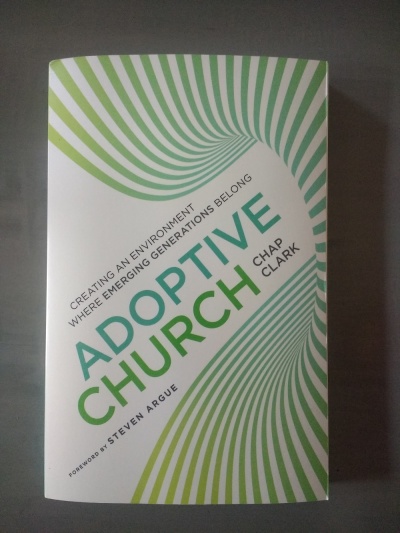Millennial Christians shouldn't be blamed for church youth decline, ministry expert says

Millennials are often misunderstood and shouldn't be scapegoats for the problem of youth who stay away from church, the author of Adoptive Church has argued.
Pastor Chap Clark, who for 21 years taught at Fuller Theological Seminary as professor of Practical Theology and Youth, Family and Culture, among other roles, told The Christian Post in a Monday phone interview that, in his experience, the narrative of "entitled millennials" is inaccurate.
“The attitude of people who are way more entitled than millennials are” is the most challenging factor keeping young people away from the church, said Clark, who is senior pastor at St. Andrews Presbyterian Church in Newport Beach, California.
Millennials are 22 to 37 years old in 2018, according to Pew Research Center.

“I have worked with young adults my entire career. The way millennials and young adults are being hammered is absolutely false in my opinion, it is exactly the opposite. Those who are entitled are the adults who are saying ‘what about me, don’t mess with my life. These kids are interrupting the life that I want to live,’” Clark added.
“The entitlement of adults and their self-centeredness, and their own commitments and their own sense of success and accomplishments is what’s killing young people because there is nobody there to guide them.”
Clark's latest book, Adoptive Church: Creating an Environment Where Emerging Generations Belong, released in October, outlines where adults and church leadership has gone wrong.

It also suggests ways churches can reorganize in order to make teens and young adults feel like they have a place to belong.
Speaking more about one of the main problems, the author said that when adults, including clergy, believe that the church belongs only to them, what happens is that young people “are told they have no place, they are told they are not welcome.”
“They hear that message loud and clear everywhere they go anyway, but when it is attached to something as core as faith” they can sense from afar that the rhetoric of a loving community is just not true, Clark said.
“Christian churches have walked far away from the reality and the vitality of the Gospel. And therefore young people just go ‘it’s false, it’s a false story,’ and then they walk away.”
As he has in several previous books examining youth ministry, part of his "Youth, Family, and Culture" series, Clark navigates through the continued decline of young people identifying with faith in his book.
The former professor explains just how important it is to foster an adoptive church environment, where congregations not only welcome, but nurture young adults, and show them what the church can offer that other institutions can not.
Clark presents a new way of thinking when it comes to youth ministry, and offers practical examples of how churches can strive for change.
New ways of thinking are very important, he told CP, given that decades of youth ministry conferences and other types of projects since the late 70s haven't had a great impact on keeping youth in the faith.
As he also explains in the book, an "adoptive church," or adoptive ministry, is a concept taken from the Bible.
John 1:12 says, “To all who did receive Him, to those who believed in His name, He gave the right to become children of God.”
The apostle Paul uses the "adoptive" concept five times in his letters, and reminds followers of Christ that they have been “adopted to sonship (or daughtership).”
“So if Paul’s appeal to unity in the church is ‘don’t you realize that we are all adopted?’ and that’s a very serious covenantal relationship, then the notion of family is such a powerful metaphor in the Scriptures,” Clark observed.
“I felt like if our biggest problem is a lack of unity — which is my diagnosis of the problem — a lack of ability to invite and include young people in the church, then we need the same appeal,” he continued.
“We need to see ourselves as siblings. So that’s the theology behind it. That adoptive ministry and the adoptive church, it recognizes our mutual adoption in Christ. And that’s really important.”
Looking at the secularization that is affecting American society, Chap noted that significant change is affecting demographics in all parts of the world.
“The increasing secularization in the U.S. is a kind of expression of a deeper crack in our our meta narrative. As a culture, we don’t share common narratives anymore," he warned.
The pastor argued that even the phrase in the U.S. Constitution "We The People" has become "almost meaningless now," because everyone "is out for their little tiny slice of what they see as important, and what they want."
He positioned that that kind of "radical individualism" is the essence of the philosophy of secularism, namely that "there's no moral guide from God; there's no moral guide from a narrative."
How that works out in the church, he offered, is that adults are basically telling young people "it's your job to join us, it's not our job to help you grow up."
In Adoptive Church, Clark talks about the failure of assimilation, and how that kind of radical individualism positions: “I will let you be with me if you become me.”
In the church, he warned, adults are saying “we’ll include young adults as long as they change for us,” which is what is leading to diminishing congregations.
Another main concept he addresses is the "challenge of change," and how church structures sometimes get in the way of fostering an adoptive ministry.
Clark echoed Harvard University Professor Ron Heifetz, who pointed out that it is not change itself that people fear, but loss.
"Our greatest fear is to lose something that we deem is important to us, and so therefore the threat of someone taking something away from us when we are barely surviving is what we are very resistant to.”
He said that church elders need to get on board with change in the church, however, both theologically and sociologically.
"The Gospel compels us to unity. And to family. We just don’t have an option," the author urged.
As an example, he suggested that the entire church leadership needs to agree to certain phrases and terms to be used as part of the corporate lexicon, such as "mutual adoption in Christ," "we are all one family," "we’re in this together."
Clark said it is important to tell stories where change is happening, so that people can see that by change they will not create loss, but gain.
Looking at the ministry of Jesus Himself, Clark noted that one message he often preaches to his congregation at St. Andrew's is that Jesus only ever got angry with people who should know better.
"Not one time was Jesus frustrated, angry, disappointed in the broken, the vulnerable, the sinner. Not one time. The model of Jesus being sensitive, kind, and tender toward the vulnerable, the broken, the sinner is a great model for us as adults to remember when we approach young people, or any person who is on the outside.”
He continued: "We need to be critical of ourselves, to make sure we are not getting in the way of the Gospel. The model of Jesus [is] arms opened, to be kind, to be spending time with them, to listen carefully, to observe.”
When the church is truly being an adoptive church, it can provide youth with three core things that nothing else can, Clark said.
"One is, we can provide an authentic nurture that is not based on performance. There is nowhere else that young people can receive that. Where people actually care whether or not you score a touchdown, or get an A," he suggested.
"Second is we can provide an authentic empowerment for young people to use their gifts and talents in a way that is safely bound within the community," he added. "In other words, we can empower kids in school, in sports, in their first job — but there is always an element of evaluation and risk."
The church, on the other hand, can empower a young person to "be a team partner on a mission trip to go build someone a house. [It's] where a kid can discover their giftedness and ability to make a difference bounded within the community, and so they can freely explore their own gifts. There’s no other place but the church that can do that as well."
Thirdly, Clark said the church can provide hope: "We can create in them a new imagination that God is actually taking them somewhere. God is faithful, and there is no secular society where they can receive that."
When it comes to what people considering youth ministry can take away from Adoptive Church, Clark insisted that the church itself must take a careful look at who God calls people to be.
“Every person plays a role in that. A youth pastor has very little power in a church. But they do have the ability to have a cup of coffee with a senior pastor, or an elder, or a deacon, and to describe how young people want to be cared for and included,” he said.
“A parent has the power to gather other parents together and see ‘how do we help our kids feel more connected?’ A senior pastor can help guide a conversation that creates new imagination. Every adult plays a role. And when we start looking carefully at who we are called to be and include young people in that, that’s when we will begin to change.”




























